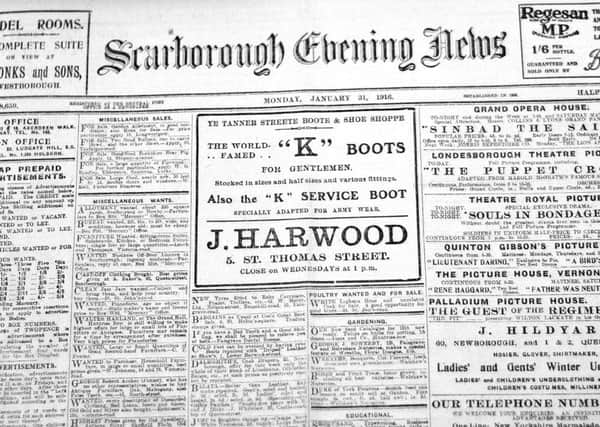1916 court: Soldier obtains credit using bogus cheques


Richard Henry Taylor Powell (34), 31st Hertfordshire Yeomanry, Colchester Barracks, described as a mining engineer, was charged on remand with obtaining by false pretences from Frank Dickinson, the sum of £7 10s, with intent to cheat and defraud, between the 12th and 19th February.
There was a further charge of obtaining from Frank Vennall £3 between the 12th and 19th February.
Prisoner pleaded guilty.
Advertisement
Hide AdAdvertisement
Hide AdMr GE Royle, who appeared for the prosecution said that Mr Dickinson was a motor carriage proprietor at 3 Westfield Mews, Alma Parade. Mr Vennall was a jeweller at 15 Victoria Road. The offence took the form of presenting two bogus cheques for £7 10s and £3 respectively, which were cashed by Dickinson and Vennall. In Mr Dickinson’s case the cheque was drawn on the Halifax Commercial Banking Company Ltd, Pontefract branch, apparently drawn by Richard Powell, in favour of HW Taylor. It was endorsed by Taylor, the prisoner, and on his assurance that it would be met and was a perfectly good cheque. Mr Dickinson fell victim. The same result applied to Mr Vennall.
Both cheques were returned by the Halifax Commercial Banking Company, marked “No account”.
How did the prisoner get into possession of the two cheques? It arose in this way. In the case of Dickinson, he had met the prisoner on occasions at the Pavilion Hotel. It would seem that on the night of Saturday 12th February, a lieutenant in the King’s Own Yorkshire Light Infantry, who was in the habit of meeting Dickinson at the Pavilion Hotel, was there and the prisoner started an acquaintance with him, both being in uniform, prisoner posing as a man in the Hertfordshire Regiment. The prisoner represented to the lieutenant that he had a large banking account with the Halifax Commercial Banking Company and had seen a cheque the lieutenant had had and asked him to be good enough to lend him two cheques on that bank, because he had left his wife at Harrogate and she wanted money to come through to join him in Scarborough. The lieutenant lent him the cheques and it was with those two blank cheques that these frauds were perpetrated.
The case of Dickinson was simple, but there was a subtlety and cleverness about the fraud against Vennall. It showed the sort of humorous craftiness which he thought the bench would view with great disapprobation. Before he became a fisher of men he must have been a very excellent fisher of roach, dace and coarse fish, because, to use an angling expression, he baited the swim.
Advertisement
Hide AdAdvertisement
Hide AdHe went to Vennall’s shop and purchased a watch. He got by mistake ten shillings too much change. He went away and afterwards returned and asked Vennall if he had found out he had given ten shillings too much change. Mr Vennall was overjoyed at seeing his ten shillings. That was the bait set. A few hours later prisoner came with his bogus cheque and on the strength of his honesty, saying, “I played the straight game with regard to the 10s,” asked Vennall to cash him the cheque for £3, and milked him to that extent. There was a humorous ingenuity about it.
He had pleaded guilty, and the only thing to consider was his past career.
Prisoner addressed the bench at length and in a cultured manner. With regard to the 10s too much he received in change, he did not discover it until he was in the Pavilion Hotel. He said to the girl there, “Should you give it back or not?” She said, “Please yourself,” and he took it back. He went at night time and cashed the cheque.
As to getting the cheques from the officer he simply said to the lieutenant that he was a soldier in the army short of money and would he lend him two cheques. The officer said that he was not supposed to do so, and asked if prisoner wanted to obtain local credit. He replied that he would see the thing was all right, and on the cheques he wrote his name saying that he had borrowed them.
Advertisement
Hide AdAdvertisement
Hide AdHe did these things not with any criminal intention but simply because he was mad. He did not think it was the action of a criminal to sign a cheque giving his name, his proper regiment, knowing all the time he was going to go back to his regiment some time or other. It was not the action of a criminal, and he did it because he had been drinking.
In conclusion prisoner appealed for mercy, saying it was not for himself he asked it; he could bear the punishment; it was for the sake of his wife.
Here prisoner was very touching in his manner, and handed up to the bench a letter from his wife.
As regarding the money he would do his best to refund it.
The chief constable: The very unfortunate position about this case is that not a penny of all this money is recoverable.
Prisoner: I intend to pay the lot back.
A sentence of six months imprisonment was imposed.
Prisoner, a tall, well-built intelligent looking man, did not utter a word as he was removed below.